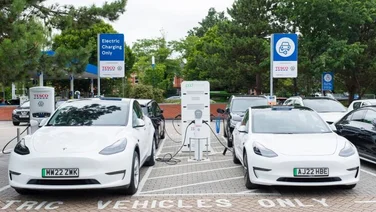Get Free Solar Panel Quotes
Find out how much solar panels would cost you
Do you need solar panels for your home or business?
Fill in our form - Get a free quote - Start saving on energy bills
Why get solar panels?
- Generate free, green electricity
- Reduce your electricity bill by up to 64%
- Get paid for what you don't use
As featured in:



News
The latest news, analysis, guides and opinion.

Octopus Energy to cut bills after Autumn Budget
The UK's largest energy provider will pass on cost savings to customers following Rachel Reeves' announcement in November.
-
 Solar energy smashes UK record Solar energy now accounts for more than 6% of the UK's energy generation following a record 2025
Solar energy smashes UK record Solar energy now accounts for more than 6% of the UK's energy generation following a record 2025 -
 Longi achieves 33.5% efficiency with flexible solar cell Chinese solar panel manufacturer Longi’s flexible solar cell has recorded a power conversion efficiency of 33.5%, far higher than the industry average.
Longi achieves 33.5% efficiency with flexible solar cell Chinese solar panel manufacturer Longi’s flexible solar cell has recorded a power conversion efficiency of 33.5%, far higher than the industry average. -
 ‘Smart’ British EV owners save hundreds of pounds more than German drivers British EV drivers are on average saving more than £540 compared to electric vehicle (EV) drivers in Germany thanks to using smart meters to charge their cars at night, according to new analysis from the Energy & Climate Intelligence Unit (ECIU).
‘Smart’ British EV owners save hundreds of pounds more than German drivers British EV drivers are on average saving more than £540 compared to electric vehicle (EV) drivers in Germany thanks to using smart meters to charge their cars at night, according to new analysis from the Energy & Climate Intelligence Unit (ECIU). -
 Offshore wind saves UK £30bn in energy costs New data from the Energy and Climate Intelligence Unit (ECIU) has found that, for the first time, UK offshore wind generation overtook the amount of electricity generated from domestically-produced gas in 2024, generating around 10% more power.
Offshore wind saves UK £30bn in energy costs New data from the Energy and Climate Intelligence Unit (ECIU) has found that, for the first time, UK offshore wind generation overtook the amount of electricity generated from domestically-produced gas in 2024, generating around 10% more power. -
 What is the ECO4 Scheme? The government has released its new ECO4 scheme, which will run until March 2026 – but what does it cover and are you eligible? Find out here.
What is the ECO4 Scheme? The government has released its new ECO4 scheme, which will run until March 2026 – but what does it cover and are you eligible? Find out here. -
 Octopus Energy integrates AlphaESS batteries with intelligent tariffs Octopus Energy will include storage batteries from AlphaESS UK in its intelligent tariffs as part of its Zero Bills initiative in a deal designed to offer more value for billpayers.
Octopus Energy integrates AlphaESS batteries with intelligent tariffs Octopus Energy will include storage batteries from AlphaESS UK in its intelligent tariffs as part of its Zero Bills initiative in a deal designed to offer more value for billpayers. -
 Drivers can save £1,450 a year by buying a secondhand EV Secondhand electric vehicle (EV) drivers will still save around £1,450 a year, on average, despite plans for a new 3p-per-mile tax on EVs.
Drivers can save £1,450 a year by buying a secondhand EV Secondhand electric vehicle (EV) drivers will still save around £1,450 a year, on average, despite plans for a new 3p-per-mile tax on EVs. -
 How do ground source heat pumps work? For episode 13 we welcomed Stuart Gadsden of Kensa to find out more about ground source heat pumps
How do ground source heat pumps work? For episode 13 we welcomed Stuart Gadsden of Kensa to find out more about ground source heat pumps -
 EV giant offers chance to ‘beat the Budget’ with tax rebate Chinese company Omoda & Jaecoo offers EV tax rebate to help customers following the 3p-per-mile tax announced by Rachel Reeves
EV giant offers chance to ‘beat the Budget’ with tax rebate Chinese company Omoda & Jaecoo offers EV tax rebate to help customers following the 3p-per-mile tax announced by Rachel Reeves